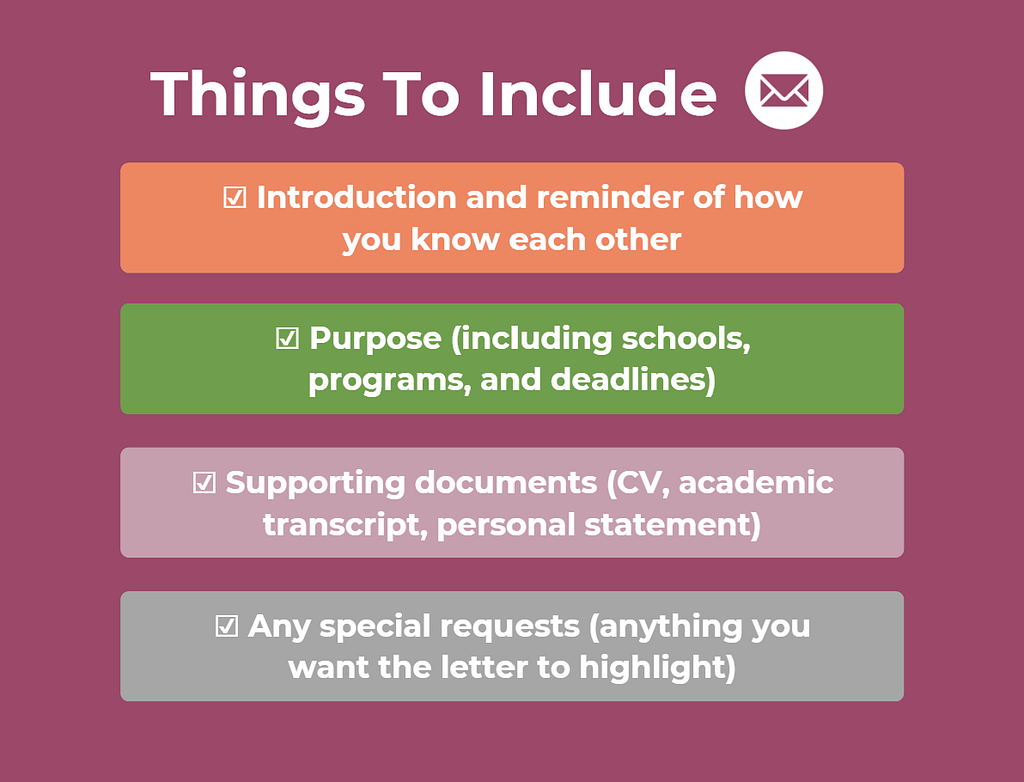Are you planning to apply to graduate school? If so, the question of who and how to ask for recommendation letters is likely on your mind.
Recommendation letters from your existing or former instructors form a crucial component of graduate school applications. Committees prioritize them because they provide a more nuanced reflection of your abilities and personality than your GPA and transcript, but a more objective one than your own personal statement.
Understanding best practices for requesting letters can greatly enhance your application. Here’s a comprehensive guide on how to approach this task effectively, from someone who has both written and requested numerous recommendation letters over the years.
1. Overcoming the Hesitation to Ask for Letters
When I was a student, I was very nervous about asking my professors to write letters for me, because I didn’t want to be a burden. As a faculty member, I realized those worries were completely unnecessary. Professors expect these requests, and consider it part of their job to write them.
If you are nervous, it may be helpful to remember two things. First, professors are paid for their work, so you don’t need to feel guilty or hesitant about asking them for help! Second, literally the very worst thing that can happen is that they say no because they are too busy or don’t feel in a position to write a good letter for you. In that unlikely case, you can just move on and ask someone else, it’s no big deal.
Personally, when I receive a request for a letter I feel happy that I have the opportunity to help a student succeed, and flattered that they chose to ask me. However, professors are busy people, and the key is to make your request respectfully and professionally, ensuring you make it as easy as possible for it to be fulfilled.

2. How to Request a Recommendation Letter
I always recommend making a formal request by email. Feel free to start the dialogue or follow up the email with a face to face conversation, or a WeChat or WhatsApp message if you have already interacted with your professor on these platforms before, but these informal interactions should be alongside, not a replacement for, a formal email request.
An email means it is likely to go more smoothly on to your professor’s to-do list, you have a clear record of the request, and can attach useful supporting documents (more on this below).
Professors deal with many students over the course of an academic year, and it’s unlikely they remember every detail about you, your academic achievements, or your career aspirations (as much as they want to learn every detail about every student, it is practically impossible). As a result, you need to give background information.
I have always asked every student who wants a recommendation letter for at least three things: (1) an up to date CV; (2) an academic transcript, and (3) a list of the schools and programs they are applying to and their deadlines. When these things are provided up front, rather than me having to ask for them, it’s great.
So, here’s what you should include in your request:
- Introduction and reminder: Politely remind the professor who you are, mentioning where and when you met, such as “I was in your XXXX course in Fall 2023, and wrote my final paper on XXXX.”
- Purpose of the letter: Clearly state why you are requesting the letter, attaching the list of graduate programs you are applying to, along with their deadlines.
- Supporting documents: Also attach your CV, your academic transcript, and a draft of your personal statement if possible.
- Special requests: If there are specific achievements or qualities you would like your professor to emphasize, mention these politely in your request. This could include – for example – mentioning an internship or research project that is particularly relevant to the program being applied to, or an attestation of your English language abilities if English is your second language.
Your goal is to keep the request as brief as possible (20 pages of your life story are not helpful in this situation….) while also providing enough information to write a compelling and personalized letter.
Provided your request is informative and professional, with the right amount of necessary detail, and you have had positive interactions with your professor in the past, your professor should be more than happy to write a request for you.

3. Choosing the Right Professors to Ask
Selecting who to ask for a recommendation is crucial. Admissions committee members may read hundreds of letters, and while you may spend hours carefully curating your application materials, the truth is that committees will read them as quickly as possible, given the volume they need to get through.
That means to give your application the best possible chance, your letters need to stand out from the crowd. The way to do this is to make them personalized. This requires choosing faculty who know you well, ideally those who have taught you in more than one class or have supervised you in a research or academic project. That means they are likely to be able to provide specific examples of your work (don’t hesitate to remind professors of these in your request email).
In general, it’s better to approach a professor who knows you well rather than someone famous who taught you in a class of hundreds of students and may well not remember much about you (however, if you have worked closely with someone famous then great – ask them!)
I would not recommend choosing your letter writers based on who you think is most approachable or “nice”. Instead, work on the assumption that the faculty you approach will be open to your request (and as mentioned above, if they are not, it’s no big deal – just move on and ask someone else).

4. Timing Your Request and Follow Ups
Timing is important. To ensure your professors have ample time to write a thoughtful letter, make your request no later than three weeks before the application deadline. This gives them enough time to fit the task into their busy schedules without rushing. Moreover, asking for a letter 24 hours before the deadline is simply not polite, and is unlikely to result in a positive outcome for you.
After your initial request, it can be useful to follow up if you have not received a confirmation of the letter being sent. Personally, I appreciate a gentle reminder from students one week before the deadline if I have not yet submitted the letter. This can be a simple email thanking them for their assistance and gently reminding them of the upcoming deadline.
(Tip: If you’re not already using a deadline tracker or calendar app to keep track of your own deadlines, get one! It reduces stress and makes you more productive.)
It’s also great to follow up after you have received your offers to thank your letter writers. I love receiving messages from students telling me about their success (I even have an email folder dedicated to saving these messages!).

Conclusion
Recommendation letters are not a mere formality, they are a significant part of your graduate school application. However, asking for them does not need to be a daunting task. By approaching the right people (i.e. those that know you best) politely, in advance, and providing the necessary supporting information, you can get the strong letters you need to succeed in graduate school applications.
Remember, professors are there to help you on your academic journey, so don’t hesitate to approach them. Ultimately, your success is a win-win for both you and your professors.
Would this article be helpful for someone you know? Click the links below to share ⬇
Check out more tips for academic success by following Discovery Hub on social media ⬇
Copyright @ 2024 Discovery Hub Educational Consulting (Suzhou) Ltd 探索枢纽教育咨询(苏州)有限公司.